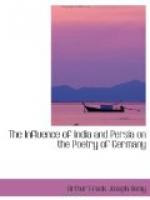* * * * *
It only remains to say a few words on the question of the value of this Oriental movement to German literature. We are not inclined to put too high an estimate on the poetry that arose under its influence. In fact, we do not think that it has produced what may be called really great poetry. It is significant that the fame of most of the poets considered in this investigation does not rest on that part of their work which was inspired by Oriental influence. We cannot possibly agree with the view that would place Goethe’s Divan side by side with the master’s best productions. We do not believe that he ever would have become famous through that. Platen’s Ghaselen have neither the merit nor the reputation of his sonnets or his ballads. Even among the Ghaselen and Oestliche Rosen of Rueckert, the finest poems, such as “Sei mir gegruesst” and “Du bist die Ruh,” both immortalized by the genius of Schubert, are precisely those that are least Oriental, and we think it is safe to say that the Liebesfruehling exceeds in fame any one of Rueckert’s Oriental collections, including the Weisheit des Brahmanen. The exception to the rule is Bodenstedt. His reputation rests almost solely on the Mirza Schaffy songs; but it will scarcely be pretended that this is great poetry.
From what has been said it may be inferred that the chief value of the Oriental movement does not consist in its original contributions to German literature, but rather in the reproductions and translations it inspired. For it was through these that the treasures of Eastern thought were made the literary heritage, not of Germany alone, but of Europe. As far as the literature of Germany itself is concerned, this movement was of the greatest significance, in that it introduced the Oriental element and thereby helped powerfully to impart to German letters the spirit of cosmopolitanism for which men like Herder and Goethe had so earnestly striven. The great writers of ancient Greece and Rome had long since been familiar to the German people; Shakespere, Dante and Calderon had likewise won a place by the side of the German classics through the masterly work of the Romanticists; and now the spirit and form of a new literature—light from the East—was brought in by the movement which has been the subject of this investigation and assumed its place as a recognized element in the literature of Germany. The fond dream of a Weltlitteratur thus became a reality, and the German language became the medium of acquaintance with all that is best in the literature of the world. The Oriental movement is the clearest proof of that spirit of universality, which is at once the noblest trait and the proudest boast of German genius.
[Illustration]
Transcriber’s Notes
There are many spelling and capitalization inconsistencies in the original of this text. These have been retained in this version, except those noted below.




